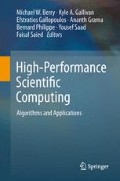Abstract
Non-negative tensor factorization (NTF) is a technique that has been used effectively for the purposes of analyzing large textual datasets. This article describes the improvements achieved by creating a Python implementation of the NTF algorithm, and by integrating it with several pre-processing and post-processing functions within a single Python-based analysis environment. The improved implementation allows the user to construct and modify the contents of the tensor, experiment with relative term weights and trust measures, and experiment with the total number of algorithm output features. Non-negative tensor factorization output feature production is closely integrated with a visual post-processing tool, FutureLens, that allows the user to perform in-depth analysis of textual data, facilitating scenario extraction and knowledge discovery.
Access this chapter
Tax calculation will be finalised at checkout
Purchases are for personal use only
References
Bader, B., Kolda, T.: MATLAB Tensor Toolbox, version 2.4 (2010). http://csmr.ca.sandia.gov/~tgkolda/TensorToolbox/
Bader, B., Puretskiy, A., Berry, M.: Scenario discovery using nonnegative tensor factorization. In: Ruiz-Schulcloper, J., Kropatsch, W. (eds.) Proceedings of the Thirteenth Iberoamerican Congress on Pattern Recognition, CIARP 2008. LNCS, vol. 5197, pp. 791–805. Springer, Berlin (2008)
Carroll, J., Chang, J.: Analysis of individual differences in multidimensional scaling via an N-way generalization of ‘Eckart-Young’ decomposition. Psychometrika 35, 283–319 (1970)
Harshman, R.: Foundations of the PARAFAC procedure: models and conditions for an explanatory multi-modal factor analysis. UCLA Work. Pap. Phon. 16, 1–84 (1970)
Numpy documentation (2010). http://docs.scipy.org/doc/numpy
Puretskiy, A.: A visual approach to automated text mining and knowledge discovery. Ph.D. thesis, Department of Electrical Engineering and Computer Science, University of Tennessee, Knoxville (2010)
Scholtz, J., Plaisant, C., Grinstein, G.: IEEE VAST 2007 Contest (2007). http://www.cs.umd.edu/hcil/VASTcontest07
Shutt, G., Puretskiy, A., Berry, M.: Futurelens: software for text visualization and tracking. In: Proc. Ninth SIAM International Conference on Data Mining, Sparks, NV (2009)
Author information
Authors and Affiliations
Corresponding author
Editor information
Editors and Affiliations
Rights and permissions
Copyright information
© 2012 Springer-Verlag London Limited
About this chapter
Cite this chapter
Puretskiy, A.A., Berry, M.W. (2012). Knowledge Discovery Using Nonnegative Tensor Factorization with Visual Analytics. In: Berry, M., et al. High-Performance Scientific Computing. Springer, London. https://doi.org/10.1007/978-1-4471-2437-5_17
Download citation
DOI: https://doi.org/10.1007/978-1-4471-2437-5_17
Publisher Name: Springer, London
Print ISBN: 978-1-4471-2436-8
Online ISBN: 978-1-4471-2437-5
eBook Packages: Computer ScienceComputer Science (R0)

